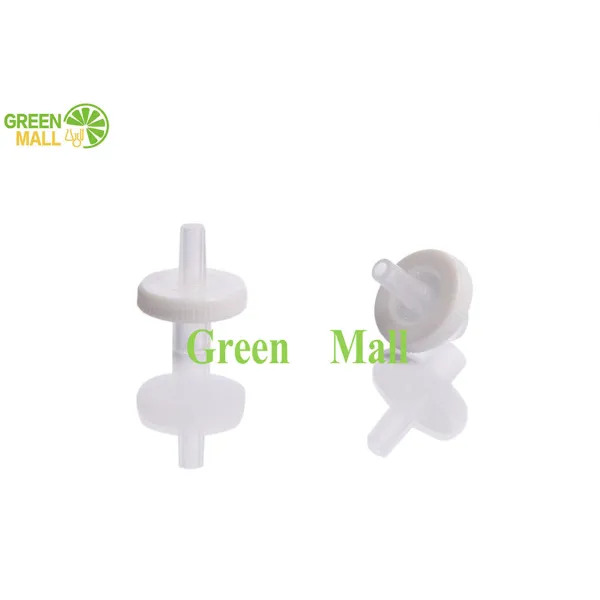The Critical Role of Syringe Filters in Modern Laboratory Workflows
Eliminating Particulate Contamination
In labs around the world, syringe filters are pretty much indispensable when it comes to getting rid of those pesky particles that contaminate samples. Lab folks have seen time and again how these little devices cut down on particulates by something like 99% or better, making them really good at keeping samples clean for analysis. What makes them work so well? The filter material inside grabs particles down to about 0.22 microns in size, which matters a lot when experiments require pinpoint accuracy. Labs stock up on different types too since manufacturers make syringe filters from various materials like PVDF and Nylon. This range means scientists can pick what works best for their particular project, whether they're dealing with proteins, DNA, or just regular solutions. Having options like this definitely saves time and headaches in the long run.
Ensuring Compatibility with Analytical Instruments
Getting syringe filters compatible with analytical instruments matters a lot for preventing damage and getting good results. When someone uses the wrong filter type, it really messes up how well the instruments work, which means expensive fixes down the road plus all sorts of bad data problems. Picking filters depends heavily on what kind of analysis we're doing, whether it's HPLC testing or gas chromatography stuff. Most lab techs know this already, so they always check if their sampling setup matches both the filter specs and whatever instrument they need to run. Taking time to match these things properly keeps equipment running smoothly while making sure test results stay trustworthy across different experiments.
Alignment with Conical Centrifuge Tubes for Sample Integrity
Getting syringe filters properly aligned with those conical centrifuge tubes matters a lot if we want to avoid leaks and keep samples intact. Labs have noticed time and again that when things aren't lined up right, samples just disappear during processing, making all the hard work collecting them pointless. When the fit between filter and tube is spot on, it makes a real difference in how accurate our test results turn out. Good alignment isn't just about preventing spills either it actually maintains what scientists call sample integrity through every step of filtration. This attention to detail pays off big time in lab settings where consistency across multiple tests is absolutely critical for meaningful scientific conclusions.
How Syringe Filters Improve Chromatographic Accuracy
Reducing Baseline Noise in HPLC/UHPLC Analysis
Syringe filters really matter when it comes to cutting down on baseline noise during HPLC or UHPLC analysis. Without them, all sorts of unwanted background signals start messing with our chromatographic data. Good quality syringe filters make a world of difference though they give us those clean, sharp signals we need for proper analysis. Labs that have switched to these filters report much better peak shapes and more consistent retention times across their runs. For labs working with small sample volumes, there are special filters available that work even better at reducing noise levels. These specialized options help maintain data integrity throughout the entire chromatography process from sample prep right through to final results interpretation.
Preventing Column Clogging and Signal Interference
Keeping columns from getting clogged remains one of the biggest headaches in chromatographic work, which is why many labs turn to syringe filters as their go-to fix. When samples pass through these filters first, it stops particles from blocking the column and messing up signals during analysis. Lab technicians who make syringe filtration part of their routine find that their columns last much longer before needing replacement or cleaning due to buildup. The science backs this up too clean sample paths mean better reproducibility across tests, so results stay consistent and trustworthy something absolutely critical when conducting serious research where accuracy matters most.
Synergy with Sterile Centrifuge Tubes for Sensitive Samples
When working with sensitive biological samples during analysis, combining syringe filters with sterile centrifuge tubes makes all the difference. This setup keeps samples clean and intact, which matters a lot when trying to get reliable results from experiments. Labs that have tested this approach report much lower contamination problems compared to other methods. The filters catch unwanted particles while the sterile tubes protect against outside contaminants. For anyone dealing with fragile samples in a lab environment, this combo isn't just helpful it's practically essential if they want their experiments to stand up to scrutiny later on.

Material Selection: Balancing Chemical Resistance and Performance
PTFE vs Nylon Membranes for Organic/Aqueous Solutions
Choosing between PTFE and nylon membranes matters a lot when it comes to getting good filtration results, especially since these materials react differently to all sorts of chemicals and solvents. Most labs go with PTFE filters when dealing with harsh solvents because this stuff just doesn't break down easily no matter what gets thrown at it. On the other side of things, nylon works great with water-based samples and handles pretty much anything from proteins to DNA without causing issues. Lab technicians swear by chemical compatibility charts though. These handy references show exactly which membranes work best with specific substances, helping avoid those frustrating situations where samples get ruined during processing. A quick glance at the right chart saves time and money in the long run.
Low-Protein Binding Options for Biological Samples
Syringe filters designed to bind less protein are really important for keeping samples intact during protein testing. They help cut down on sample losses and lead to better test accuracy overall. Studies show certain filter materials can slash protein binding rates by around 95% in lab settings. That kind of performance makes these filters essential tools for anyone working with proteins in biological research. What kind of membrane gets used matters a lot too. Different materials affect how experiments turn out, so scientists need to pick membranes that match what they're trying to measure. Getting this right improves both the accuracy and reliability of test results across the board.
Matching Pore Size to Sample Storage Vial Requirements
Getting the relationship between pore size and sample storage vial requirements right matters a lot when it comes to good filtration results. Research shows that picking the wrong pore size can lead to problems where either important compounds get stuck in the filter or unwanted stuff slips through, messing up the whole analysis process. Labs really need to know what they're working with before selecting those syringe filters. When there's a proper match between filter specs and lab requirements, it makes all the difference. Contaminants stay where they should be, not getting into samples, which keeps test results reliable and trustworthy across different experiments and projects.
Optimizing Filtration Protocols Across Industries
Pharmaceutical QC: Dissolution Testing Applications
In pharmaceutical quality control work, especially when running dissolution tests, syringe filters play a really important role. These little devices stop unwanted particles from messing up how drugs dissolve in test conditions, which means lab results stay much more consistent across different batches. Labs that track their data over time tend to see better repeatability when they properly filter samples through good quality syringe filters. Most experienced QC technicians will tell anyone who asks that including these filters in daily lab protocols isn't just recommended it's practically mandatory nowadays. The difference they make in keeping test results accurate can be huge, and this matters a lot because regulatory bodies demand strict compliance with testing standards in the pharmaceutical sector.
Environmental Monitoring with Polypropylene Systems
Most environmental testing labs rely on syringe filters when collecting samples from water sources and monitoring airborne pollutants. Labs across the country tend to go with polypropylene filters because they work well with different solvents and hold up pretty good even when dealing with tricky sample compositions. Real world testing has shown these filters deliver consistent results that matter a lot for proper environmental analysis. What makes polypropylene stand out is how it handles all sorts of samples without breaking down, which explains why so many monitoring programs include them in standard procedures. This reliability helps create better pollution maps and supports more accurate assessments of potential health risks facing communities.
Integrating Graduated Centrifuge Tubes for Volume Precision
Using graduated centrifuge tubes together with syringe filters makes a big difference for getting accurate measurements when working with liquids, something that matters a lot in lab research. When these tools work together properly, scientists get those exact volume readings they need, cutting down on mistakes that can throw off entire experiments. Most lab protocols actually require this kind of precision because even small errors in measuring liquids can lead to completely wrong results. Labs that invest in quality equipment like proper centrifuge tubes end up with better data across all their liquid handling tasks. This attention to detail isn't just good practice it's practically essential for any serious scientific work where reproducibility counts.
FAQ
What are syringe filters used for in laboratories?
Syringe filters are used to eliminate particulate contamination, maintain sample purity, and ensure compatibility with analytical instruments. They are critical in various procedures, such as minimizing baseline noise in chromatography and preventing column clogging.
How do syringe filters improve chromatographic accuracy?
Syringe filters reduce baseline noise in HPLC/UHPLC analysis, prevent column clogging, and extend the lifespan of analytical columns, thus delivering accurate and reproducible analytical results.
Why is material selection important for syringe filters?
Material selection is crucial because different filters, such as PTFE or Nylon membranes, offer varying levels of chemical resistance and performance suited for specific applications, ensuring proper sample filtration and preventing degradation.
How do syringe filters contribute to pharmaceutical quality control?
In pharmaceutical quality control, syringe filters prevent particulate interference during dissolution testing, lead to consistent analytical outcomes, and support compliance with industry standards.




